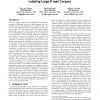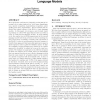90 search results - page 17 / 18 » Learning Context for Collective Activity Recognition |
INFSOF
2007
13 years 5 months ago
2007
This paper presents a framework that draws on Structuration theory and dialectical hermeneutics to explicate the dynamics of software process improvement (SPI) in a packaged softw...
CORR
2010
Springer
13 years 15 days ago
2010
Springer
We consider an opportunistic spectrum access (OSA) problem where the time-varying condition of each channel (e.g., as a result of random fading or certain primary users' activ...
CEAS
2006
Springer
13 years 9 months ago
2006
Springer
One of the biggest challenges in building effective anti-spam solutions is designing systems to defend against the everevolving bag of tricks spammers use to defeat them. Because ...
CIKM
2011
Springer
12 years 5 months ago
2011
Springer
Word prediction performed by language models has an important role in many tasks as e.g. word sense disambiguation, speech recognition, hand-writing recognition, query spelling an...
JKM
2007
13 years 5 months ago
2007
Purpose – The purpose of this paper, drawing as it does on earlier research, is to provide the context for a discussion on the use of rewards and recognition programmes in knowl...


